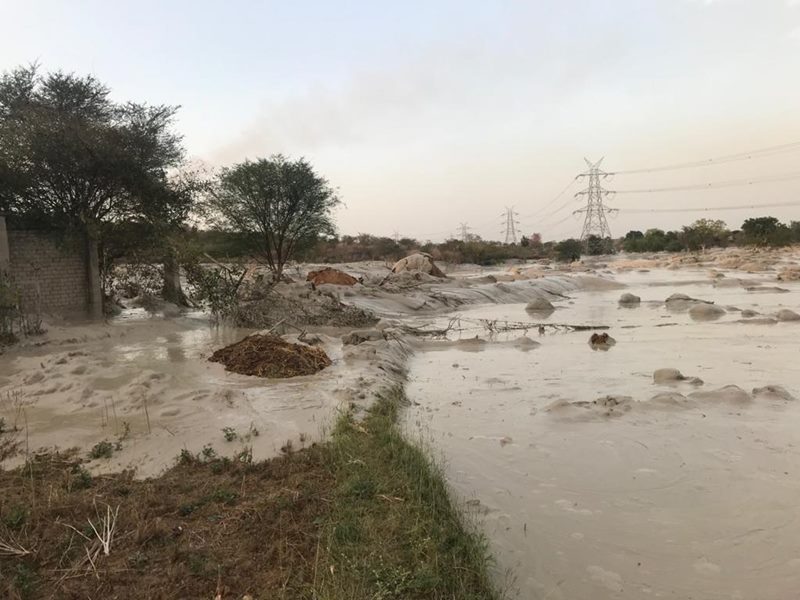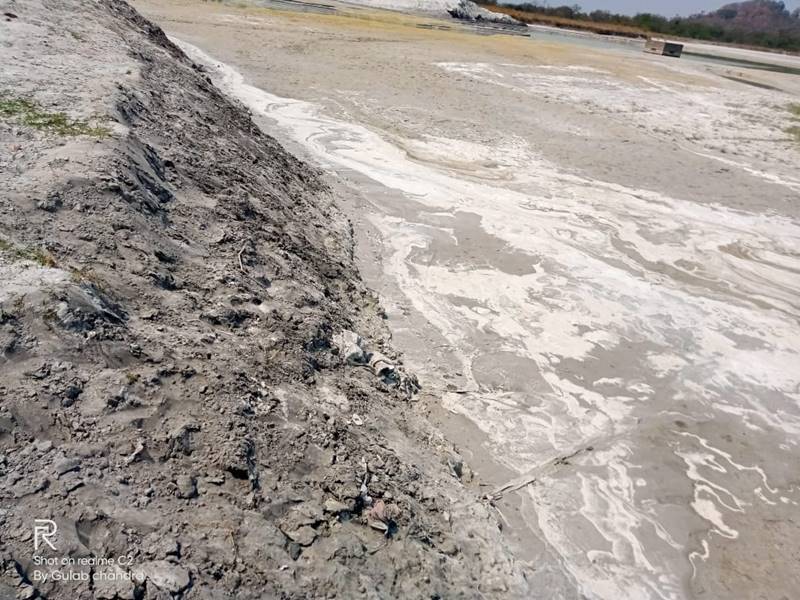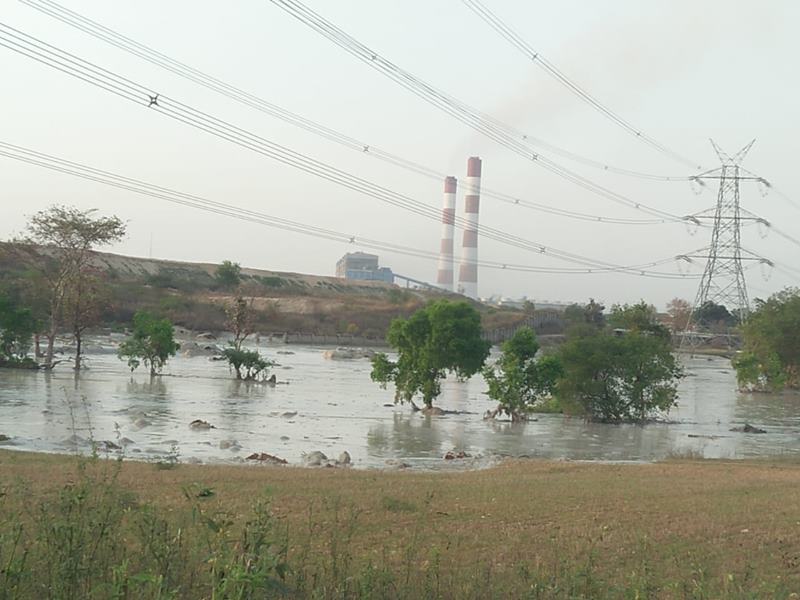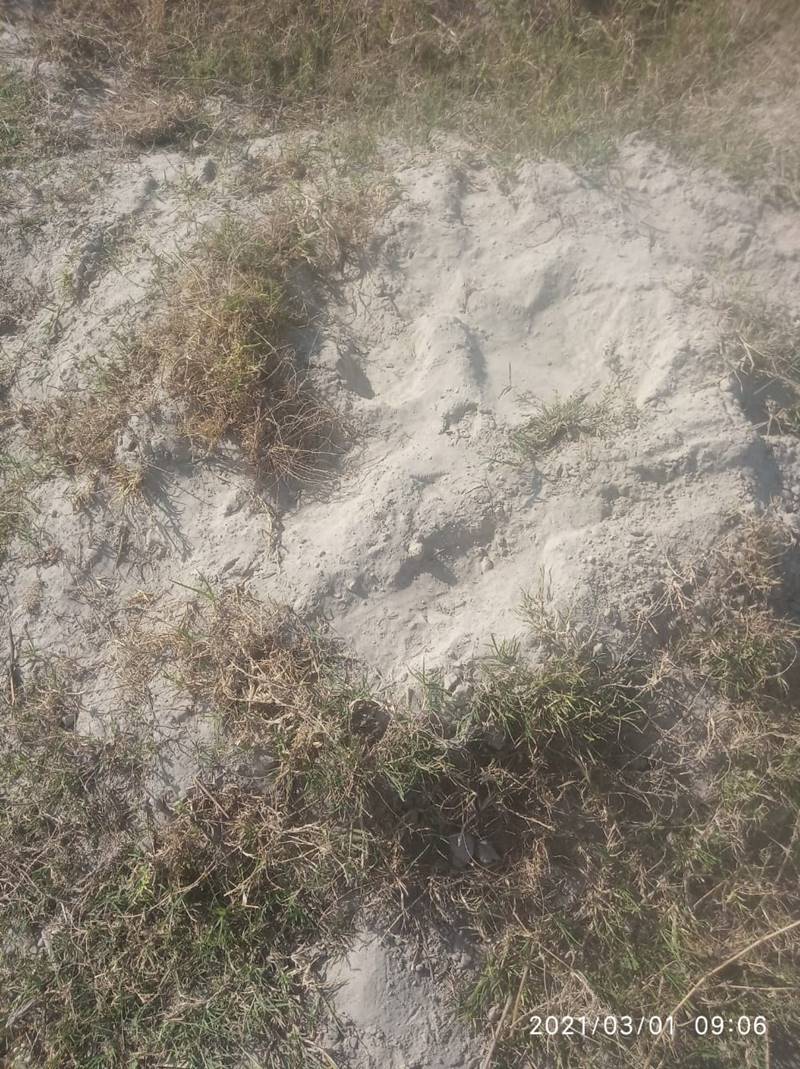‘Eight major coal ash breach accidents in past two years, penalties levied but not paid by coal-based power plants’
Highlighting the current state of fly ash related accidents at coal based power plants in India in the last two years, a new study shows how despite levying penalties and fines, several power plants did not deposit the full compensation money. Breach accidents also continued.


Immediate aftermath of an ash pond breach in Singrauli, as on April 10, 2020. Pic: Kripanath Yadav
On June 15, a fly ash breach incident reportedly occurred at the National Thermal Power Corporation (NTPC) plant and Aryan Coal Benefications (ACB) India Power plant in Korba district of Chhattisgarh. The ash dam was damaged and coal ash polluted the local water bodies and land. There was an outcry among local people.
Several such incidents of coal ash breach keep getting reported in various states of the country including Uttar Pradesh, Madhya Pradesh, Jharkhand.
Now a new study, titled ‘Lest We Forget – A status report of neglect of coal ash accidents in India (May 2019 – May 2021)’, has found that despite levying penalties and fines on coal-based thermal power plants for coal ash accidents, several of these plants have failed to deposit the full fine amount and pay compensation to the affected people.
The study not only brings to light several gaps in the management of ash related accidents but also documents the plight and sufferings of local residents impacted by the fly ash breaches.
Also Read: 7 states, 17 major incidents of coal ash mismanagement in India in past one year: Report
Based on fly ash breach incidents across the country, the study highlighted that “in some cases fly ash still remains on the fields, some wells within the vicinity of villages are still covered with ash rendering it unfit for use even several months after breach incidents occurred”.

The report — Lest We Forget — released yesterday on July 7 carried out a detailed analysis of eight coal ash breach accidents in six Indian states in the past two years between August 2019 and May 2021. It was conducted by ASAR Social Impact Advisors — a private company that works on social and environmental issues, Centre for Research on Energy and Clean Air (CREA) — an independent research organisation working on health impacts, and Manthan Adhyayan Kendra — a centre working on water and energy issues.
“All the flyash breaches are strung by a common thread, which is lack of industrial will towards transparency, accountability, compliance; and a governance system with law enforcement, penalization, and monitoring that routinely fall short,” Medha Kapoor, co-author, ASAR, was quoted as saying in the press statement issued by the researchers.
The coal-based power plants covered in the recent study include Essar Thermal Power Station (Madhya Pradesh), Anpara Thermal Power Station (Uttar Pradesh), Talcher Thermal Power Station (Odisha), Bokaro Thermal Power Station (Jharkhand), North Chennai Thermal Power Station (Tamil Nadu), and Kahalgaon Super Thermal Power Station (Bihar).

Severe health impacts, no ‘full’ compensation
The study warned of health impacts brought by the fly ash breach incidences. People are suffering from tuberculosis in affected regions in Central India, the study informed. “Airborne ash has been leading to tuberculosis cases and breathing issues especially across central India,” stated the study.
“Villagers we spoke to allege that over the years, incidence of TB (tuberculosis) is on the rise. Because of the presence of fly ash ponds near villages, people are anyhow affected and suffering from respiratory diseases,” Sehr Raheja from Manthan Adhyayan Kendra told Gaon Connection. She is one of the authors of the report.
Apart from several health impacts, the fly ash breaches also cause severe pollution in natural water bodies as ash was reportedly dumped directly in rivers.
Due to fly ash breaches, homes, agricultural land, standing crops, and surface water bodies get damaged by ash slurry spillage. District administrations and State Pollution Control Boards (SPCBs) are supposed to ensure monetary compensation for affected people. However, “the distribution of this compensation has been staggeringly inconsistent,” stated the report.
Also Read: Stuck between the coal mines and a mountain of mud: Story of an unfortunate village

Will pollute, won’t pay
According to the researchers, while some states are struggling with financial compensation, others are facing a huge ecological crisis.
Explaining the two kinds of compensation — environmental and health — Raheja said: “The environmental compensation is usually levied after directions from the NGT [National Green Tribunal]. A third party is told to assess the compensation amount to be deposited to the respective pollution control boards.”
As per the recent report, the amount of temporary environmental damage compensation levied on power plants by authorities range between Rs 10 million to Rs 100 million depending on the scale of damage.
But, only 10-20 per cent of the interim environmental damage compensation (up to Rs 10o million depending on the scale of damage caused) has been deposited by three thermal power plants in Madhya Pradesh with around 80-90 per cent still not deposited to the pollution control boards despite over 18 months from the accidents, the report said.
Also Read: Sonbhadra: The darker aspect of the golden glow

Meanwhile Bokaro thermal power station deposited an interim compensation of Rs 10 million with the Jharkhand Pollution Control Board, but not all affected locals have been compensated, claim the authors of the report.
In another instance, informs the report, the payment of compensation was still being processed with the district administration at Kahalgaon Super thermal power plant, Bihar despite a breach incident in November 2020.
As far as compensating individual villagers is concerned, “it was difficult to assess the individual compensation for affected people given COVID constraints. There is no standard amount… The amount varies with the kind of accident it was,” Raheja told Gaon Connection.
“In Bokaro [Jharkhand], people who have lost their temporary structures have received only Rs 10,000 per family. Those whose land was affected have not received any amount,” she added.
The researchers believe that “compensation is essential for affected communities, but assigning monetary values to environmental damage and impacts on human health is inherently problematic. That such accidents continue to occur despite penalties and fines also raise doubts about their effectiveness as deterrents.”

What is the way forward?
Widespread neglect of fly ash management and non-compliance with the laws, norms, notifications, and court orders on the problem as stated show that this aspect of pollution from power generation hasn’t been treated seriously by regulators or power generators themselves.
Also Read: The criminality of fly ash management
In their report, Lest We Forget, the researchers have given a few recommendations for the way forward. They suggested including the need for criminal action against violators in response to coal ash accidents, ‘mandatory’ routine technical assessments for ash ponds, increasing transparency and public access to information and continuous collective effort by civil society in holding the relevant authorities accountable.

